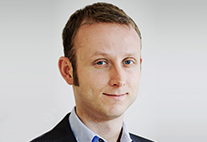and Natural Sciences
Freigeist fellowship awarded for research at the Universität HamburgMore than one million euros for the development of new super microscopes
29 July 2016, by MIN-Dekanat

Photo: privat
Dr. Kaufmanns research focuses on the development of new microscopy techniques that provide accurate images of the smallest biological structures in the nanometer range. The current methods used to study these structures, such as super-resolution light microscopy, creating “sharper” images by introducing fluorescent molecules into cells and using lasers to switch them on and off. These methods are however too slow to capture clear images of the dynamic environment within living cells. Currently, for high resolution imaging most cells are chemically fixed which can lead to structural changes. Consequently, the resulting images taken with these super-microscopes do not always reflect the actual living cell and can lead to ambiguous conclusions.
Kaufmann would like to develop a new field of microscopy –super-resolution fluorescence cryo-microscopy. This method would use cryo immobilization, a process which freezes samples so quickly that their biological structures are preserved in a native state. This technique provides scientist with longer data acquisition periods and an ideal resolution for imaging a structurally unchanged cell. Kaufman plans to develop a new microscope which will enable more precise investigations of specific biological problems like the communication in synapses and the structural composition of complex viruses.
Dr. Kaufmann will conduct his research in the CSSB Research Hotel. He will use a laboratory in the new CSSB building that has been specifically reserved for junior principle investigators. CSSB is an interdisciplinary research center studying the pathogens responsible for infectious disease and the Universität Hamburg is one of its ten partner institutions.
According to the Volkswagen Foundation the Freigeist Fellowship is awarded to support young researchers who “open up new horizons” and “move between established research fields.” Any scientist who has received a doctoral degree less than five years ago can apply for the fellowship. More than ten million Euros has been awarded to the thirteen projects that received the fellowship this year.
Contact:
Dr. Rainer Kaufmann
Wellcome Trust Centre for Human Genetics & Department of Biochemistry
University of OxfordTel: +44 (0) 1865 287815
E-Mail: rainer"AT"strubi.ox.ac.uk
Prof. Dr. Chris Meier
Universität Hamburg
Fachbereich Chemie
Tel: 040-42838-4324
E-Mail: meier"AT"chemie.uni-hamburg.de
